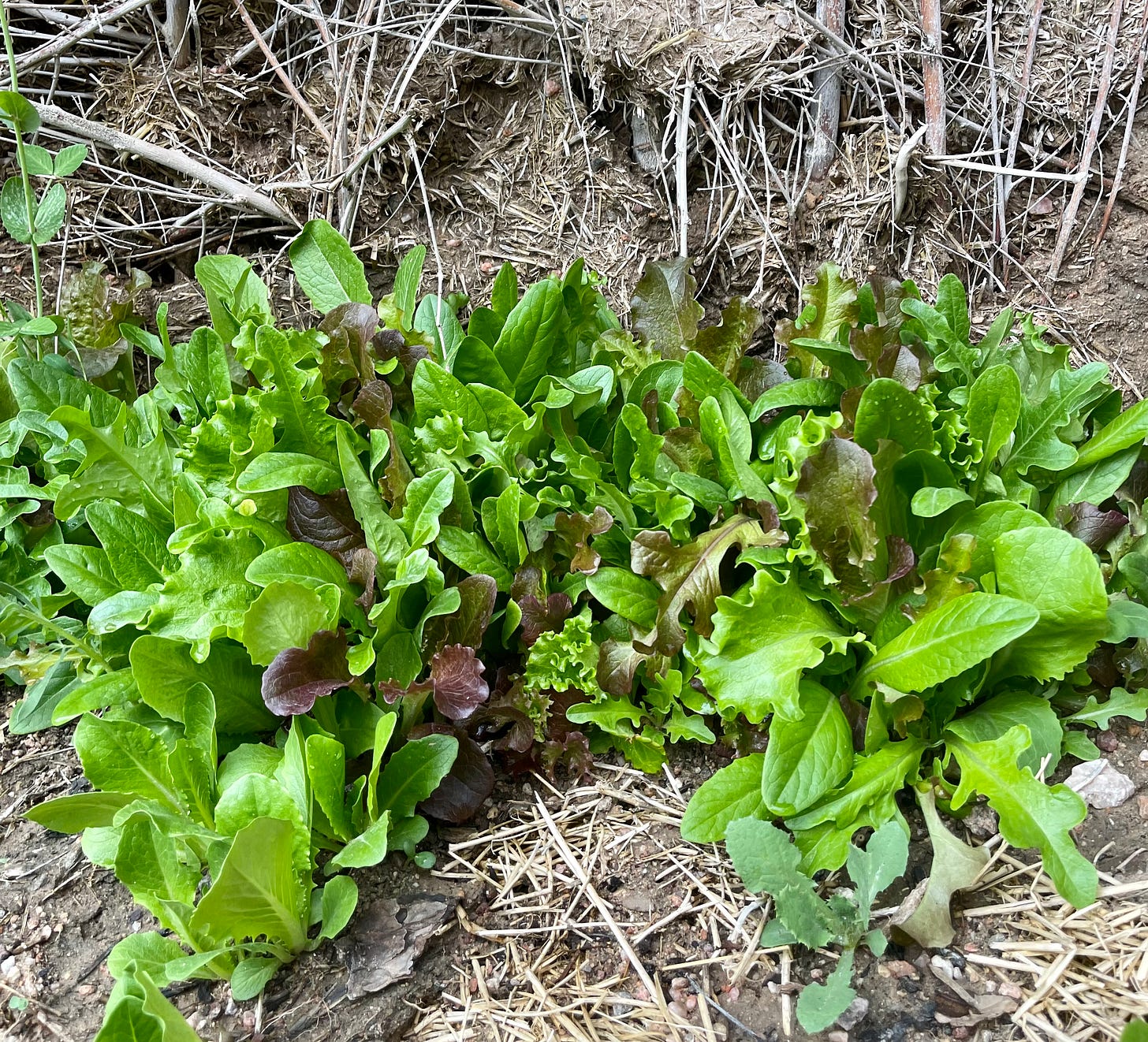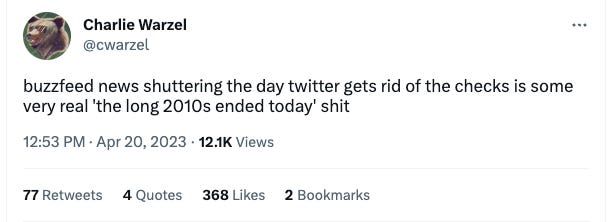"Only People Who Can Afford to Pay for It Will Have Access to High-Quality Information"
The end of BuzzFeed News
^ Lettuce from our underground greenhouse
I’m feeling lost on the internet. Yesterday, Twitter ditched legacy blue checks, yet another ding for the platform that was already starting to feel like a ghost town. Montana is trying to ban TikTok (though some say it’ll never work). Instagram is becoming insufferable. I haven’t posted on Facebook in three years, and Reddit is too in the weeds. Does Snapchat still exist?
I’ve tried Mastodon and Discord and notes on Substack, and I am left wondering why. What is the point of posting on these platforms when there are too many to keep track of, and the people I want to follow are dispersed among them?
I miss the days of blogging. When the internet felt fresh and exciting and like hanging out with a group of cool friends. But just like blogging turned into legit websites, newsletters, and social media, it certainly feels like another shift is happening. Like the era of social media is fading into something else. Whatever’s next, though, I wish it’d hurry up so I could stop sporadically posting on whatever platform I feel like I’ve been neglecting for too long. In the meantime, you can find me here.
What I’m reading
Yet another tragedy in the journalism world took place this week: A dozen years after BuzzFeed News launched, in many ways making BuzzFeed the journalistically legit site it became, its news arm closed. For someone who came into adulthood and the workforce during the BuzzFeed age, and who worked a short stint at the Huffington Post, this is larger than the shuttering of yet another digital publication. It marks the end of an era and raises concerns about the state of journalism. As Karolina Waclawiak, EIC of BuzzFeed News, wrote on Twitter:
While I believe this outcome was avoidable for BuzzFeed News, it’s indicative of a larger crisis facing journalism today. It’s deeply concerning that it seems the only way to have a sustainable news business is to put journalism behind a paywall. The implication is that only people who can afford to pay for it will have access to high-quality information while everyone else will need to parse through the rampant misinformation that is widely shared across social platforms. The consequences of this are dire.
I couldn’t agree more. While I am happy to pay for good journalism and think anyone who can afford to should, I also recognize there are many folks who can’t, and no one should be excluded from important information because of their bank accounts. But of course, the volatility of the advertising industry (not to mention VC funding) has its own issues and often leads to a lack of stability for journalists and editors, which in turn creates barriers when it comes to who can afford to take these often risky jobs. There’s got to be a better way.
NiemanLab put together a history of BuzzFeed News, that’s definitely worth a read.
BuzzFeed’s reported news age begins when the company, “in a move sure to surprise the political and journalistic classes,” announces a new hire: Ben Smith. He will do “reported blogging” and hire and edit reporters — a dozen to start. “The reporters will be scoop generators,” Peretti tells The New York Times’ Brian Stelter, and “by breaking scoops and drawing attention,” they will increase traffic and ad sales. “Great reporting and scoops will speak for themselves,” Smith tells Nieman Lab.
Read “A History of BuzzFeed News, Part I: 2011–2017” here.
Maybe what we all really need right now is to unplug. And what better way to do so than by following an old-school treasure map to gold. Daniel Miller went long on a 71-year-old map and the Hollywood executive who created it.
The story of how a handful of 21st century “forty-niners” wound up searching for gold on a singed landscape studded with Joshua trees arcs back nearly 100 years, entangling an eclectic cast of characters. Among them is a surprising figure whose treasure map would, decades after its publication, jump-start a new adventure in the Mojave Desert. This one.
The tale of that man, his map, and the place it led to is really one about Southern California’s twin mirages — fame and fortune — and the people who seek one or the other. Or both.
Read “Is Gold Hidden Under a California Peak? This Treasure Map Says So.” here.
Katie Boué wrote a book about digital environmental advocacy
And I can’t wait to read it. You can pre-order it here.
The good stuff
Silicone Baking Mat ($19): If you bake bread in a Dutch oven and are sick of burning your fingers trying to get it out, this will change your life.







